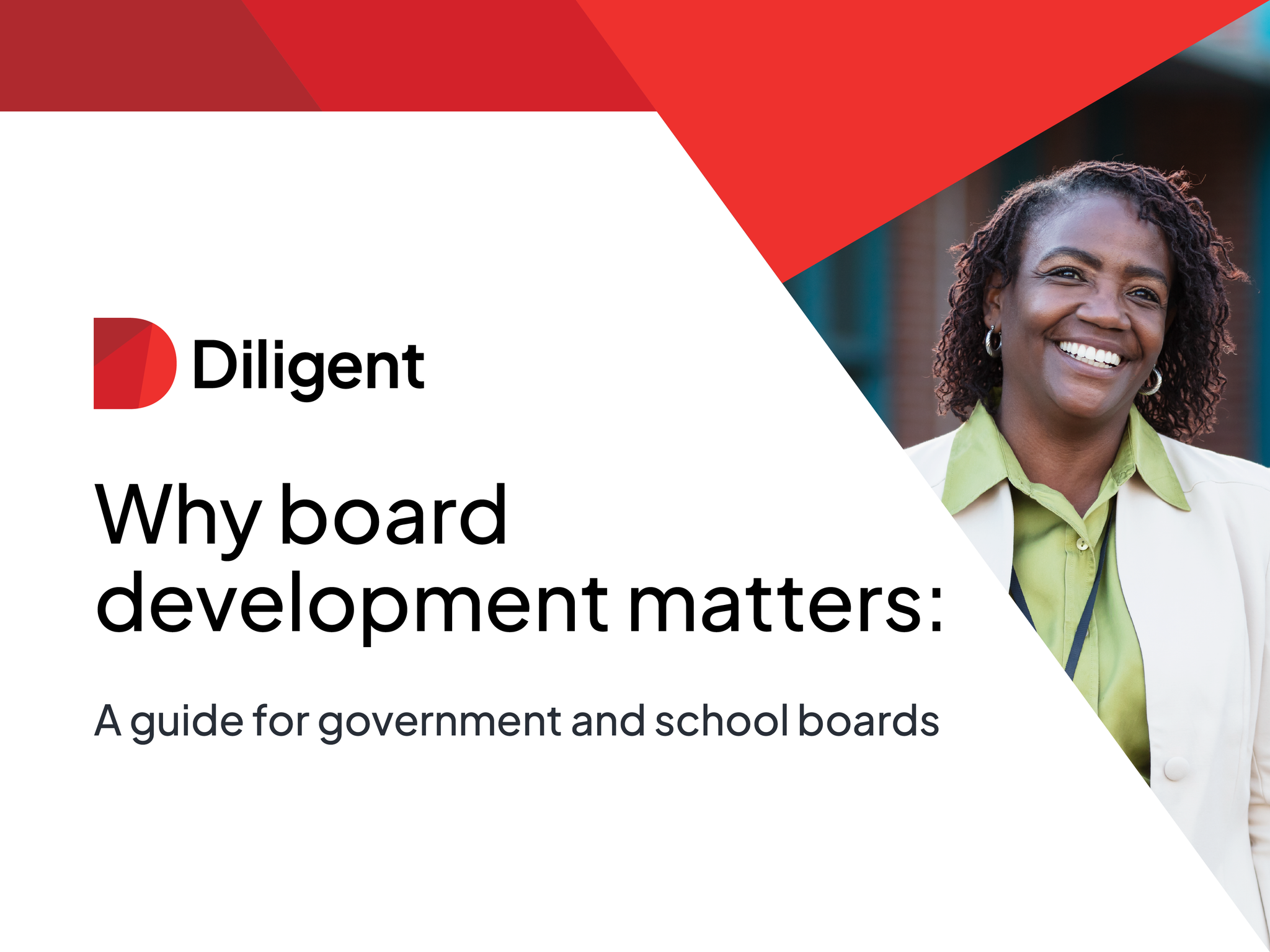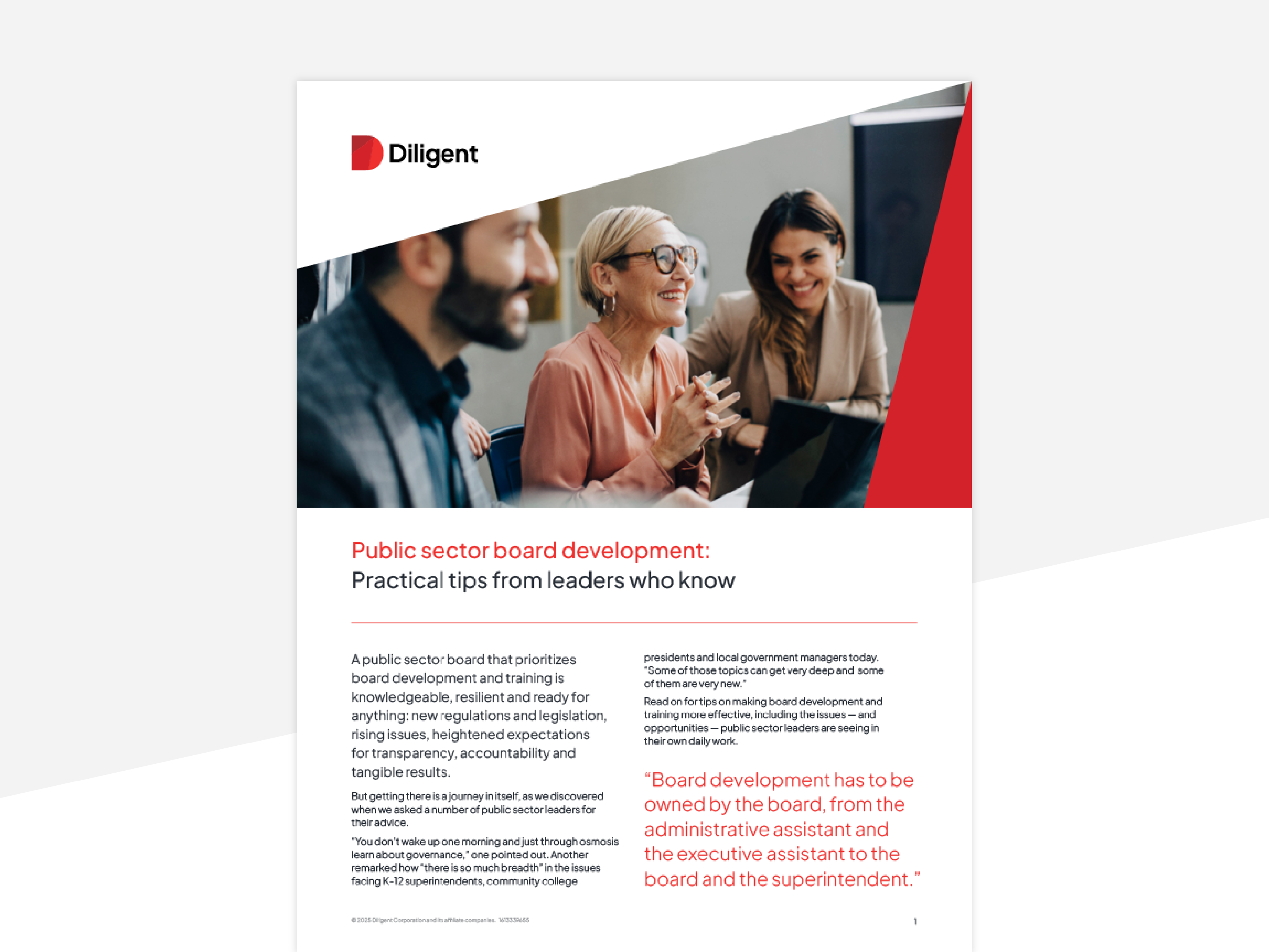Why board development matters: An infographic and guide for public boards

What happens when public board leaders speak candidly about their biggest challenges — and the tools that help them lead better? You get insights that matter.
Our newest infographic, “Why board development matters: A guide for government and school boards,” is built from real conversations with leaders in the field. They shared the hurdles they face, the breakthroughs they’ve had with training, and the strategies they rely on to make development more accessible and impactful.
We asked public board leaders to tell us about their key challenges, the benefits that they have seen of investing in training and what strategies they use to make board development more accessible and impactful.
What is board development?
Board development is the process of equipping board members with the necessary skills and knowledge to perform their roles effectively through formal training and learning opportunities. This is often a requirement in many states and municipalities.
The value of board development for public boards
Board development is crucial for the continuous improvement of the organization. Despite this, 75% of public boards conduct training only as needed, while 25% schedule it annually at board retreats.
Investing in board development pays dividends for public boards. Well-trained members bring informed perspectives and thoughtful decision-making to the table, contributing to better governance and stronger outcomes. Here are some benefits:
- Improved governance. Knowledgeable board members are equipped to address issues effectively and provide oversight that aligns with organizational goals.
- Stronger community relations. Training on communication and public engagement fosters trust and transparency with the communities served.
- A more strategic focus. Boards that prioritize development are better prepared to create and implement strategies that drive positive change.
- More cohesiveness. Training sessions — especially group-based ones — help build connections among board members, creating a culture of teamwork.
Challenges faced in board development
We asked leaders what their top challenges are when it comes to board training and development, these are the top obstacles cited.
Limited time and availability
Many board members juggle demanding schedules, making it difficult to attend training sessions or workshops.
Resistance to change
Some members may feel they already have the experience necessary and resist the idea of further learning.
Access to quality content
Getting access to comprehensive, relevant training materials can sometimes be hard, leaving members underprepared for the complexities of their roles.
Budget constraints
Many organizations struggle to allocate resources for professional training, particularly for ongoing development.
4 simple strategies for effective training
To make board development both practical and impactful, consider the following strategies:
1. Adopt everboarding. This approach acknowledges that learning is ongoing and not confined to onboarding. Start with comprehensive initial training, but continue development throughout a member’s tenure. Tailor sessions to address emerging issues, new laws or evolving community needs.
2. Flexible scheduling. Offer training options that fit members’ schedules. This could include virtual modules that can be completed independently or group sessions scheduled at mutually convenient times.
Greg Doverspike, Superintendent at Mosinee School District in Wisconsin, suggests, “Find a time when [board members] all can attend to hear the same message and have a trainer deliver the message that you want them to hear.”
3. Focus on key topics. Training should be tailored to the needs of public boards, with topics such as applicable laws, governance best practices, strategic planning and community relations.
4. Use available resources. Public boards often access training through state or membership associations, in-house programs or third-party providers.
Tip: Storing training resources on board management software can save time and budget, allowing future board members to benefit without additional costs.
The right training for public boards
Effective public board training should cover:
- Applicable laws and regulations
- Community relations
- Effective governance
- Employment and evaluation of the chief administrator
- Strategic planning and goal setting

You can also download the infographic in pdf format here.
Let's dive deeper
A well-trained board can be the difference your district needs. Here are more resources to learn how to upskill your board:
- Our guide "Making board development intuitive, ongoing and effective: A guide for public education and local government" is full of expert advice and practical tips from seasoned professionals.
- The cheat sheet "Public sector board development: Practical tips from leaders who know" is packed with actionable tips and strategies to guide you in streamlining board operations and fostering strong alignment.
- Watch our webinar "Board development: Future-proof your board with essential skills" for an engaging panel discussion about board training and development.
Diligent Community, part of the Diligent One Platform, is a robust digital solution that ensures that board members have access to the information they need, anytime, anywhere. It also helps boards remain compliant with laws and regulations, while improving engagement and alignment. Talk to one of our governance specialists today to find out how we can help your public board.

Public board development: Your ultimate cheat sheet for impact
Discover peer-tested tips & practical strategies for building stronger public boards through clear expectations, bite-sized training & tech-powered alignment.

What are the benefits of school board member development programs?
Public education boards should take advantage of board member development opportunities to tackle issues head-on and boost board and district performance

Best practices for school board member training
School board member training and development allows board members to make use of training resources and implement practices to best serve the public.

Experts share their thoughts on board development for publicly facing boards
Enhance board effectiveness through ongoing training. Experts share insights on development for nonprofits, school districts and local government. Stay ahead with key strategies.